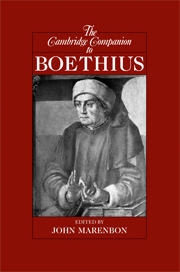Book contents
- Frontmatter
- Introduction: reading Boethius whole
- Part 1 Before the Consolation
- Part II The Consolation
- 8 The Good and morality: Consolatio 2-4
- 9 Fate, prescience and free will
- 10 Interpreting the Consolation
- 11 The Consolation: the Latin commentary tradition, 800-1700
- 12 The Consolation and medieval literature
- Appendix: Boethius’ works
- Bibliography
- Index: References to Boethius' works
- General Index
- Series list
10 - Interpreting the Consolation
from Part II - The Consolation
Published online by Cambridge University Press: 28 July 2009
- Frontmatter
- Introduction: reading Boethius whole
- Part 1 Before the Consolation
- Part II The Consolation
- 8 The Good and morality: Consolatio 2-4
- 9 Fate, prescience and free will
- 10 Interpreting the Consolation
- 11 The Consolation: the Latin commentary tradition, 800-1700
- 12 The Consolation and medieval literature
- Appendix: Boethius’ works
- Bibliography
- Index: References to Boethius' works
- General Index
- Series list
Summary
This chapter concerns itself primarily with the literary interpretation of the Consolation. This will involve taking account of generic markers, sources, allusions, and narrative patterns and structures to read the Consolation accurately and meaningfully. There will be some coverage of different types of critical approaches applied to it, especially those of more recent critics. The chapter will conclude with some discussion of a matter that is not strictly speaking literary, namely the Christianity of the Consolation. For one can indeed think of texts, in addition to authors, as having religious affiliations, and much of the evidence used to determine such affiliations requires philological detective work.
The Consolation, an undisputed masterpiece of Latin literature, was widely read and imitated and exerted a powerful literary influence during the Middle Ages and beyond. The very fact can be distorting, for most educated readers, willy nilly, are aware of its later fortuna, and can experience difficulties in taking off the multiple colored lenses of reception to recover the work in its original historical and literary context. It is still, astonishingly, alive, as a touchstone for the eccentric, appalling (but also appealing) Ignatius Reilly in A Confederacy of Dunces. The Consolation stands at the end of many ancient traditions that it consciously invokes and evokes and is a work of considerable literary innovation in its own right. Boethius wrote the Consolation as a last work, and it is tempting to see him shoring fragments up, not just against his own ruin, but against that of the Romanitas he so prized, and whose last, most glorious representative he arguably was.
- Type
- Chapter
- Information
- The Cambridge Companion to Boethius , pp. 228 - 254Publisher: Cambridge University PressPrint publication year: 2009
- 31
- Cited by



